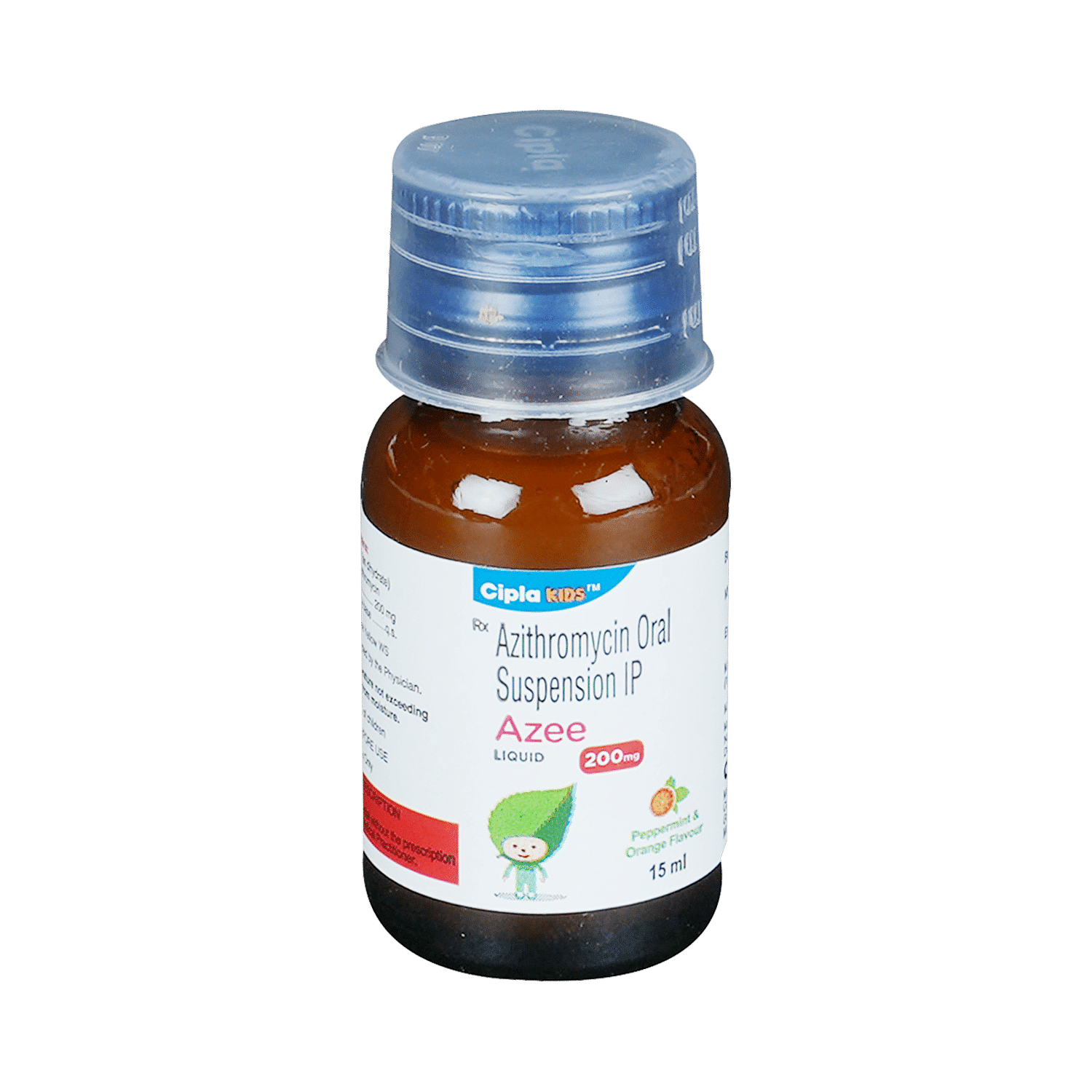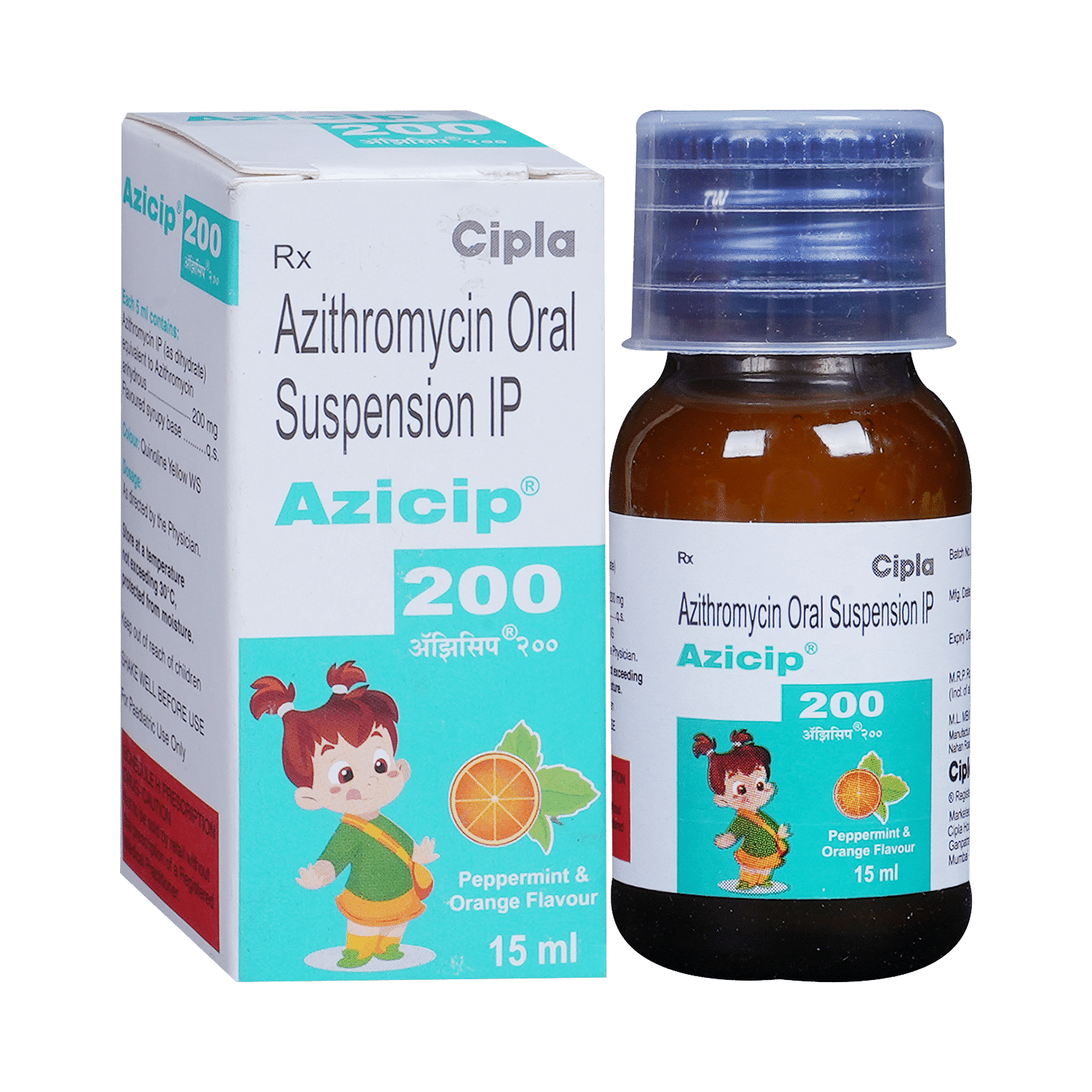
Maxomycin 200mg Oral Suspension
Manufacturer
Abony Healthcare Limited
Salt Composition
Azithromycin (200mg)
Key Information
Short Description
Maxomycin 200mg Oral Suspension is an antibiotic medication used to treat a wide range of bacterial infections in children.
Dosage Form
Oral Suspension
Introduction
Maxomycin 200mg Oral Suspension is an antibiotic medication commonly given to children for the treatment of bacterial infections targeting the ear, eyes, nose, throat, lungs, skin, and gastrointestinal tract. It is essential to complete the entire course of this medicine to avoid the bacteria multiplying again or causing another infection.
Directions for Use
Give Maxomycin 200mg Oral Suspension with food to avoid an upset stomach. Encourage your child to drink plenty of water in case diarrhea develops as a side effect.
How it works
Maxomycin 200mg Oral Suspension is an antibiotic that works by interfering with the synthesis of essential proteins required by bacteria to perform important functions. It stops the infection-causing bacteria from growing further and prevents the infection from spreading.
Quick Tips
Complete the entire course of this medicine to avoid the bacteria multiplying again or causing another infection Give Maxomycin 200mg Oral Suspension with food to avoid an upset stomach Encourage your child to drink plenty of water in case diarrhea develops as a side effect Only give Maxomycin 200mg Oral Suspension to your child for their current infection Stop the medicine and contact the doctor immediately if your child develops an itchy rash, facial swelling, and breathing difficulties soon after the intake
Related Medicines

Azee 200mg Liquid Peppermint & Orange

Azicip 200mg Oral Suspension

Azelac 200mg Oral Suspension

Azi 200mg Oral Suspension

Aedizith Oral Suspension

Zythscot 200mg Oral Suspension

Azeemed 200mg Oral Suspension

Zoycin 200mg Oral Suspension

Azido 200mg Oral Suspension

Azikia 200 Oral Suspension
Frequently asked questions
What if I give too much of Maxomycin 200mg Oral Suspension by mistake?
If you accidentally give your child too much Maxomycin 200mg Oral Suspension, it is unlikely to cause harm. However, if you suspect an overdose, seek immediate medical attention from a doctor. Overdose may lead to unwanted side effects and potentially worsen your child's condition.
Are there any possible serious side effects of Maxomycin 200mg Oral Suspension?
Maxomycin 200mg Oral Suspension may cause serious side effects, including persistent vomiting, kidney damage, allergy, diarrhea, and severe gastrointestinal infections. If you notice any of these symptoms, consult your child's doctor for guidance and support.
Can other medicines be given at the same time as Maxomycin 200mg Oral Suspension?
Maxomycin 200mg Oral Suspension may interact with other medications or substances. Inform your doctor about any other medicines your child is taking before starting Maxomycin 200mg Oral Suspension. Additionally, consult your doctor before administering any other medication to your child.
Can I get my child vaccinated while on treatment with Maxomycin 200mg Oral Suspension?
Antibiotics like Maxomycin 200mg Oral Suspension do not typically interfere with vaccine ingredients or cause adverse reactions in children who have recently been vaccinated. However, it is recommended to wait until your child has recovered from their illness before receiving a vaccine. Once your child is feeling better, the vaccine can be administered.
Which all lab tests should my child undergo while taking Maxomycin 200mg Oral Suspension on a long-term basis?
Your child's doctor may recommend periodic kidney function tests and liver function tests to monitor their condition while taking Maxomycin 200mg Oral Suspension for an extended period.
Can Maxomycin 200mg Oral Suspension impact my child's digestion?
Children may experience stomach upset while taking medicines, including antibiotics like Maxomycin 200mg Oral Suspension. This medication may also disrupt the balance of good bacteria in the gastrointestinal tract, increasing the risk of developing other infections. If your child experiences diarrhea while taking Maxomycin 200mg Oral Suspension, do not stop the medication course. Instead, consult your child's doctor for guidance on the next steps.
Why is Maxomycin 200mg Oral Suspension given for 3 days?
The duration of treatment with Maxomycin 200mg Oral Suspension depends on the type of infection being treated and the patient's age. The medication is not necessarily given for 3 days. In most cases, a single dose of 500 mg is administered for 3 days, or it may be given as 500 mg once on day 1 and then 250 mg once from day 2 to day 5. In some cases, a single 1 gram dose may be prescribed. Always follow the treatment regimen advised by your doctor.
What should I avoid while taking Maxomycin 200mg Oral Suspension?
It is recommended to avoid taking antacids with Maxomycin 200mg Oral Suspension, as this may affect the medication's effectiveness. Additionally, patients taking Maxomycin 200mg Oral Suspension should avoid exposure to sunlight or tanning beds, as the medication may increase the risk of sunburn.
Is Maxomycin 200mg Oral Suspension a strong antibiotic?
Maxomycin 200mg Oral Suspension is an effective antibiotic used to treat various bacterial infections. Compared to other antibiotics, Maxomycin 200mg Oral Suspension has a longer half-life, which means it stays in the body for a longer period. This allows for a once-daily dose and a shorter treatment duration. Other antibiotics typically have a shorter half-life and are administered more frequently.
Can you get a yeast infection from taking Maxomycin 200mg Oral Suspension?
Some individuals may develop a fungal or yeast infection, known as thrush, after taking Maxomycin 200mg Oral Suspension. Antibiotics like Maxomycin 200mg Oral Suspension can disrupt the balance of good bacteria in the intestine, leading to thrush. If you experience symptoms such as a sore, vaginal itching, or discharge, or notice a white patch in the mouth or tongue, inform your doctor. It is essential to report any of these symptoms to your doctor, even after stopping the medication.


